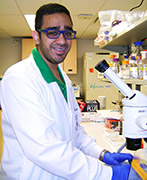Pay it forward
By Betty Zou
Prem Nichani is the child his parents never thought they would have.
Six years before he was born, Nichani’s mother was diagnosed with endometriosis, a painful condition in which the endometrial tissue lining the uterus grows outside the uterus and can cause impaired fertility. In an effort to relieve the severe pain and bleeding she was experiencing, doctors removed one of her ovaries. His parents had come to terms with that they would likely never have children. They were surprised and overjoyed when, years later, she became pregnant and gave birth to a healthy baby boy.
When Nichani was seven years old, his mother experienced debilitating pains that forced her to undergo a total hysterectomy to remove her uterus and remaining ovary. He recalls a difficult time when he was not allowed to visit his mom in the hospital because of the SARS epidemic and her condition took a turn for the worse. “Luckily she’s with me today,” he says with a relieved smile.
Now an undergraduate health sciences student entering his third year at Wilfrid Laurier University in Waterloo, Nichani is spending the summer researching ovarian biology as part of the D+H SRI Summer Student Research Program at Sunnybrook Research Institute (SRI). He is working in the lab of Dr. Clifford Librach, an associate scientist in the Women & Babies Program and director of the CReATe Fertility Centre.
Librach’s research is focused on diverse aspects of reproductive biology, including biomarkers for female infertility and egg quality and using umbilical cord stem cells to treat diseases. “When I heard about a fertility clinic that doesn’t just specialize in fertility, but also conducts research in other highly-specialized areas, I felt like it was a great environment for me to understand what happened to my mom and get involved in research,” says Nichani.
Under the guidance of research associate Dr. Shlomit Kenigsberg, Nichani is investigating the role of leukemia-inhibiting factor (LIF) receptor in egg growth and maturation and embryo implantation. One key question he is trying to answer is whether LIF receptor levels change in women with different-sized ovarian reserves. He is conducting his studies using follicular fluid, the liquid that surrounds an immature egg cell. The fluids, which are normally discarded, are from patients undergoing assisted reproductive therapy.
For Nichani, seeing other members in the lab, including Kenigsberg, work alongside him at the bench is a big motivation. “I’m surrounded by people who really know what they’re doing,” he says. “Having your supervisor right there makes a difference because you’re able to approach them. It’s an environment that makes me happy and want to come to work every day.”
In addition to his full-time research job, Nichani works as a Child Life volunteer at the Hospital for Sick Children, a position he’s held for five years. He is also busy studying for the MCAT exam, a medical school admission test he is writing later this summer. He hopes to become a clinician-scientist and specialize in pediatrics.
In May, Nichani attended the annual research day organized by the department of obstetrics and gynaecology at the University of Toronto. There, a lecture by Dr. Hamish Wallace of the University of Edinburgh on fertility preservation for young cancer patients helped him realize the possibility of combining his passions for medicine and research. “To be able to combine pediatrics with fertility and reproduction—it just opened my mind to the different things I could do,” he says.
Through all of this, Nichani is driven by a desire to understand his mother’s struggles with health and fertility and a deep gratitude for the lives they have. He can think of no better way to show his appreciation for the care his family received than helping a new generation of patients as both a physician and researcher.
Prem Nichani received a D+H Summer Studentship Award.



